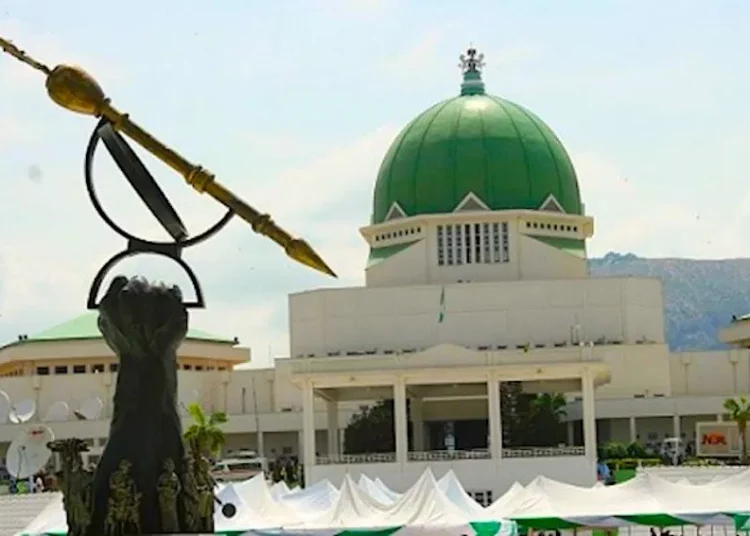Socio-Economic Rights and Accountability Project (SERAP) has urged the Federal High Court in Abuja to compel the leadership of the National Assembly to disclose the details of its N344.85 billion 2024 budget.
SERAP, in a suit that is yet to be assigned to a judge is seeking an order of mandamus to direct and compel the Senate President, Godswill Akpabio and Speaker of the House of Representatives, Tajudeen Abbas to disclose, clarify and explain details of the N344.85 billion National Assembly budget in the Appropriation Act 2024.
The civil society organisation is also asking the court for an order of mandamus to direct and compel Akpabio and Abbas to disclose, clarify and explain the details of the N8.5 billion budgeted for ‘National Assembly liabilities’ in the Appropriation Act 2024 and the nature of any such liabilities and how and why they have been incurred.
The plaintiff is also seeking an order of mandamus to direct and compel Akpabio and Abbas to disclose, clarify and explain details of the proposed spending of the N3 billion for the ‘Senate Car Park’ and N3 billion for the House of Representatives Car Park in the Appropriation Act 2024.
Akpabio and Abbas are sued for themselves and on behalf of all members of the National Assembly.
SERAP, in the suit marked FHC/ABJ/CS/178/2024 argued in an affidavit attached to it that details of spending of public funds by the National Assembly have been mostly shrouded in secrecy and that Nigerians have the right to know the budget details by the lawmakers and the rationale for the budget.
It also averred that opacity in the spending of the N344.85 billion National Assembly budget would negatively impact the fundamental interests of the citizens and the public interest.
The plaintiff further claimed that the National Assembly ought to be more responsible to the public interest and more responsive to it and that the assembly has a constitutional responsibility to combat waste and abuse in its spending to effectively exercise its oversight functions and hold the government to account.
The organisation maintained that transparency and accountability in public administration is an essential element of democracy and that transparency in the spending of the National Assembly budget would give the public a tool to hold the lawmakers accountable.
SERAP further stated that it is in the public interest and the interest of justice to grant the application because Nigerians are entitled to their constitutionally and internationally recognised human information rights.
It further argued that, “the public interest in obtaining the information sought outweighs any other interests. The oversight afforded by public access to such details would serve as an important check on the activities of the lawmakers and help to prevent abuses of the public trust.
“Disclosing, clarifying and explaining details of the spending of the National Assembly budget would improve public trust, and allow Nigerians to track and monitor the spending, and to assess if the items on the budget are justified, as well as to hold lawmakers to account in cases of mismanagement and corruption.
“Disclosing, clarifying and explaining the details of the proposed spending of the N344.85 billion National Assembly budget would also ensure that lawmakers are answerable to the people for their duties.
“By the combined reading of the provisions of the Nigerian Constitution, the Freedom of Information Act, and the African Charter on Human and Peoples’ Rights, there are transparency obligations imposed on the National Assembly to disclose, explain and clarify the rationale for several items in the budget.
“Nigerians have a right to scrutinise how their lawmakers spend their tax money and commonwealth, especially given the precarious economic realities in the country and the impact of the removal of fuel subsidy on vulnerable Nigerians.
“The National Assembly increased its allocation in the 2024 budget to N344.48bn. The new budgetary allocation to the National Assembly is over 70 per cent of the N197bn proposed by President Bola Tinubu for the lawmakers in the budget proposal submitted to the National Assembly.”
According to the organisation, the N344.48bn National Assembly budget, which is an increase of about N147bn, is reportedly the highest-ever budgetary allocation to the National Assembly.
They added the items contained in the N344.48bn National Assembly budget including National Assembly Office – Senate – N49.1bn; House of Representatives – N78.6bn; National Assembly Service Commission – N12.3bn; Legislative Aides – N20.3bn; NILDS – N9.09bn; Service-wide votes – N15.1bn; Senate Appropriation Committee– N200m.
“Other budget items include: House Appropriation Committee – N200 million; Public Account committees of Senate and House – N280.7 million National Assembly Library Take Off Grant – N12.1 billion; National Assembly building (ongoing) – N4.2 billion; and National Assembly Liabilities – N8.5 billion.
“Other items include National Assembly E-Library – N225 million; Constitution Review – N1 billion; and Completion of NILDS HQ – N4.5 billion; Construction of NASC Building – N10 billion; Office of Clerks and Permanent Secretaries – N1.2 billion; and Alternative Power System – N4 billion.
“Other items in the National Assembly budget include National Assembly Zonal Offices – N3bn; Senate Car Park – N3 billion; House of Representatives Car Park -N3 billion; and furnishing of committee rooms (Senate) -N2.7 billion; Furnishing of committee rooms (House) – N3 billion; Design, Construction, Furnishing and Equipping of National Assembly Ultramodern Printing Press – N3 billion.
“There are also other items in the budget: Design, Construction, Furnishing and Equipping of the National Assembly Budget and Research Office (NABRO) – N4 billion; National Assembly Hospital Project – N15 billion.
“Other items are: National Assembly Recreation Centre – N4 billion; Procurement of Books for the National Assembly Library – N3 billion; and National Assembly Pension Board (Take-Off Grant) – N2.5 billion,” SERAP stated.











